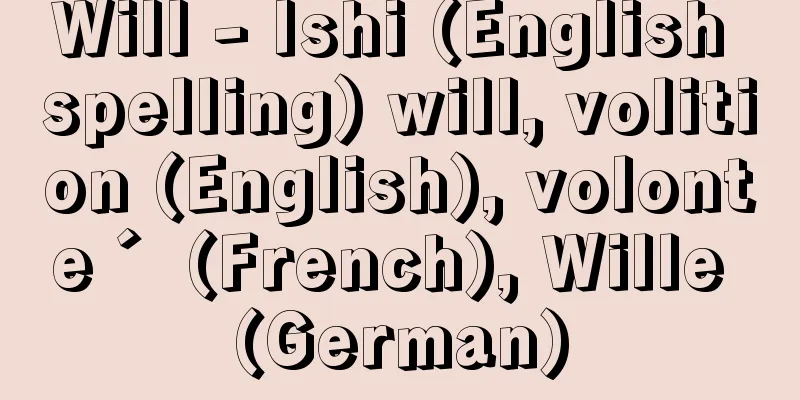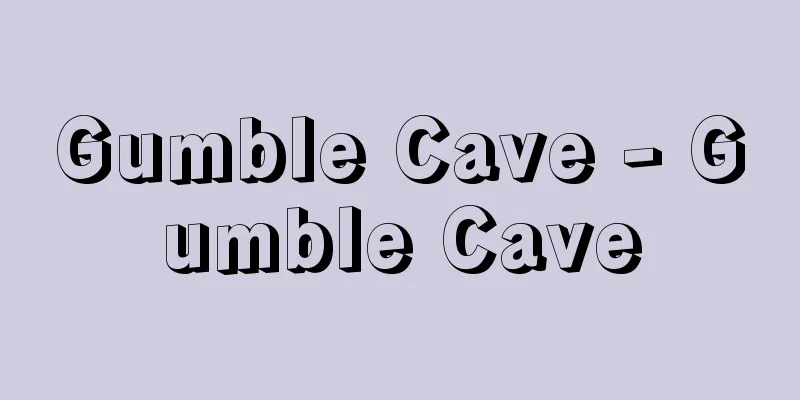Will - Ishi (English spelling) will, volition (English), volonte´ (French), Wille (German)

|
The English words will and volition both have their origins in the Latin velle (to wish). In everyday life, will is first recognized as a subjective experience of desire, i.e., "I want to do something" or "I will do something." According to Tatsuro Yatabe's "History of Will Psychology" (1942), the word "will" has almost never been used in empirical psychology based on modern experiments since the advent of behaviorism. The main reason for this is that consciousness has ceased to be a direct subject of research in psychology since the advent of behaviorism. Most of the information processing in humans proceeds as an unconscious process, and consciousness has come to be considered an epiphenomenon of neural activity. As a result, will, which is recognized as a subjective experience, has also been reduced to an automatic and unconscious process of neural activity, and has lost its place in empirical psychology. Another reason is that the concept of will has historically been ambiguous. It may also be related to the fact that the analytical methodology of psychology has broken down the vague mental activity of will into numerous manipulable elements. Looking at the history of philosophy and the prehistory of psychology, will has been considered synonymous with desire in the broadest sense and as the cause of behavior. James, W., in Psychology: Brief Course (1892), states that "All actions resulting from sensory stimuli are aimed at avoiding harmful things and obtaining beneficial things, and there is no clear division between reflexes, through semi-reflexes consisting of both instinct and will, and voluntary acts which are the action of the will." Psychological terms such as reflex, drive, motivation, and need are all desire-based concepts that explain the causes of behavior, and include various levels from the connection between sensory and motor nerves in the spinal cord to the desire for self-actualization. Throughout history, people have not only considered the will as a desire. In his book Mental philosophy (1859), translated by Nishi Amane as Psychology, Haven writes, "In the voluntary movement of the hand, there is first the object, then the motive, thirdly the choice, and finally, when the will is put into action, the hand will move unless there is an impediment or impairment to bodily functions." In modern psychological terms, everyday experiences that can be called the will involve at least four processes: incentive, motivation, decision-making, and performance. In addition to these, the will can also include processes called perseverance, which is the persistence of continuing to make efforts without giving up when there is an impediment to obtaining the object of desire, and self-control, which is the process of suppressing behavior while maintaining the selected desire. In other words, the reason why the study of will has fallen out of favor in modern psychology is not because the mental processes to which the word will applies has lost their meaning in everyday life, but because psychology's efforts to precisely explore the mental processes by breaking them down into their elements have made it impossible to represent the diverse processes and phenomena with a single concept of will. However, this does not mean that the concept of will has been completely lost from psychology. In some areas of clinical psychology and in positive psychology, which has become increasingly important in recent years, the existence of free will, which allows us to choose our own actions of our own volition, is widely accepted in relation to choice. Historically, free will was affirmed by Aquinas, T. and Descartes, R., but was denied by Spinoza, B. and Hume, D. Nevertheless, psychology that assumes the existence of free will is needed because we are forced to distinguish between the perspective from which we view ourselves and the perspective from which we view others. As mentioned above, the term "will" itself has become less used in recent years. Meanwhile, "will" was introduced as a legal term to indicate the location of responsibility, but this word gradually became popular among the general public and came to be mixed with "will." This trend has also spread to the psychology field, and the frequency of use of "will" has decreased, leading to a similar mix-up. In order to avoid unnecessary confusion, for example, will refers to the process or function of selecting and achieving more ethical or social goals by suppressing or controlling emotions, and corresponds to will or volition. In contrast, will refers to the process or function of selecting and achieving more rational and adaptive goals by cognitive and computational information processing, and corresponds to intention. For future developments, such a distinction in usage is desirable. → Decision making → Motivation → Positive psychology → Desire [Utsugi Seisuke] Latest Sources Psychology Encyclopedia Latest Psychology Encyclopedia About Information |
|
英語のwillやvolitionの語源はいずれもラテン語のvelle(望む)である。日常的には,意志はまず「~したい」あるいは「~しよう」という欲望desireの主観的体験subjective experienceとして意識される。矢田部達郎の『意志心理学史』(1942)によると,近代以降の実験を基礎とする実証主義的心理学においては,意志の語はほとんど使用されなくなったとされる。その主たる理由は,行動主義以来,意識consciousnessが心理学の直接の研究対象ではなくなったことである。人間の情報処理の多くは意識されない過程として進行しており,また意識は神経活動の随伴現象epiphenomenonと考えられるようになったために,主観的体験として意識される意志もまた,自動的で無意識的な神経活動の過程に還元されることになり,実証的な心理学においてはその地位を失ったということであろう。 もう一つの理由は,歴史的に見て意志の概念が多義的であったことが挙げられる。また,心理学の分析的方法論によって,意志という曖昧な心の働きが多数の,操作可能な要素へと分解されてきたこととも関連しているだろう。哲学の歴史,また心理学の前史を見ると,意志は最も広義には欲望と同義であり,行動を引き起こす原因として考えられてきた。ジェームズJames,W.は『心理学Psychology:Briefer Course』(1892)の中で,「感覚的刺激によって生じる行為はいずれも有害物を避け有益なものを得ようとするものであって,反射から,本能と意志の両者からなる半反射を経て,意志の作用である随意的行動voluntary actに至るが,その間に明確な区切りはない」と述べている。反射reflex,動因drive,動機づけmotivation,欲求needなどの心理学用語はすべて行動の原因を説明する欲望的概念であるが,そこには脊髄における感覚神経と運動神経の結合から,自己実現self-actualizationの欲求に至るまでのさまざまな水準が含まれている。 歴史の中で人びとが考察の対象としてきた意志は,欲望的な側面に限定されていたわけではない。西周が『心理学』として翻訳したヘブンHaven,J.の著書『Mental philosophy』(1859)の中で,ヘブンは「手の意志的運動においてはまず目標物があり,次いで動機があり,第三に選択があり,最後に意志を実行に移せば,妨げがない限りまた身体の機能に損傷がない限り,手が動く」と述べている。現代の心理学の用語に直せば,意志とよばれうる日常の体験には,少なくとも誘因incentive,動機づけ,意思決定decision makingと遂行performanceという四つの過程がかかわっているといえるだろう。さらにこのほかにも,欲求の対象を獲得するうえで妨害が存在する場合にあきらめずに努力を続ける粘りperseveranceや,選択した欲求を保持しつつ行動を抑制する自制self-controlとよばれる過程も,意志に含めることができるだろう。つまり,現代の心理学において意志の研究が行なわれなくなったのは,日常生活の中で意志ということばが当てはまる心の働きに意義が失われたからではなく,心の働きを要素に分けて精密に探究しようとする心理学の努力の中で,多様な過程や現象を,意志という一つの概念で代表することができなくなったからであるということができるだろう。 しかし,意志の概念が心理学からまったく失われたというわけではない。臨床心理学の一部や,近年その重要性を増してきたポジティブ心理学positive psychologyにおいては,選択に関連して,自らの行動を自らの意志で選ぶことができるという自由意志free willの存在が広く認められていると考えてよい。自由意志は,歴史的に見るとアクイナスAquinas,T.によって,またデカルトDescartes,R.によって肯定されたが,スピノザSpinoza,B.によって,またヒュームHume,D.によって否定された。それでも自由な意志の存在を前提とする心理学が求められるのは,われわれが,自分自身を見る視点と他者を眺める視点とを使い分ける必要に迫られているからであろう。 前述したように,近年は意志という術語そのものも使われることが少なくなった。一方,法律用語として責任能力の所在を示す「意思」が導入されていたが,この語はしだいに一般に浸透し,意志と混用されるに至った。心理学界にもその流れが波及し,意志の使用頻度が減衰して,同様な混用が起こっている。そこで無用な混乱を避けるために,たとえば,意志は情動の抑制や制御によってより倫理的または社会的目標を選択し遂行する過程や機能を指し,willまたはvolitionに対応するものと規定する。これに対し,意思は認知的・計算論的情報処理によってより合理的・適応的目標を選択し遂行する過程や機能を指し,intentionに対応するものと規定する。今後の展開を図るためには,このような使い分けが望ましい。 →意思決定 →動機づけ →ポジティブ心理学 →欲求 〔宇津木 成介〕 出典 最新 心理学事典最新 心理学事典について 情報 |
Recommend
Chlorophytum capense (English spelling) Chlorophytum capense
…[Ichiro Sakanashi]. … *Some of the terms that me...
Integralista Party - Integralista Party
A colloquial name for the Brazilian Integralista B...
ADR - ADR
A general term for a method of settling everyday d...
Oxidation dyes - Sankasenryo (English spelling) Oxidation colors
A dye that develops color as it is generated thro...
Haley, A.
...A novel by the contemporary American author Al...
Fractography
This is translated as fracture surface analysis. I...
Ceruloplasmin
…The green rings caused by copper deposition on t...
Onejime Port
A port in Kinko-cho, Kimotsuki-gun, Kagoshima Pref...
Island Kitchen - Island Kitchen
...DK means a combination of dining room and kitc...
Twardowski
A Russian (Soviet) poet. The son of a blacksmith i...
Onokami [village] - Onogami
A village in Kitagunma County, central Gunma Prefe...
Compression molding
...The following describes typical molding method...
Eye spot
Also called eye-like patterns. They also seem to r...
Hairpin - Kougai
A type of hair ornament for women, it is characte...
Bottom trawl fishing - Dragnet fishery
This is a type of fishing that involves sinking a ...









